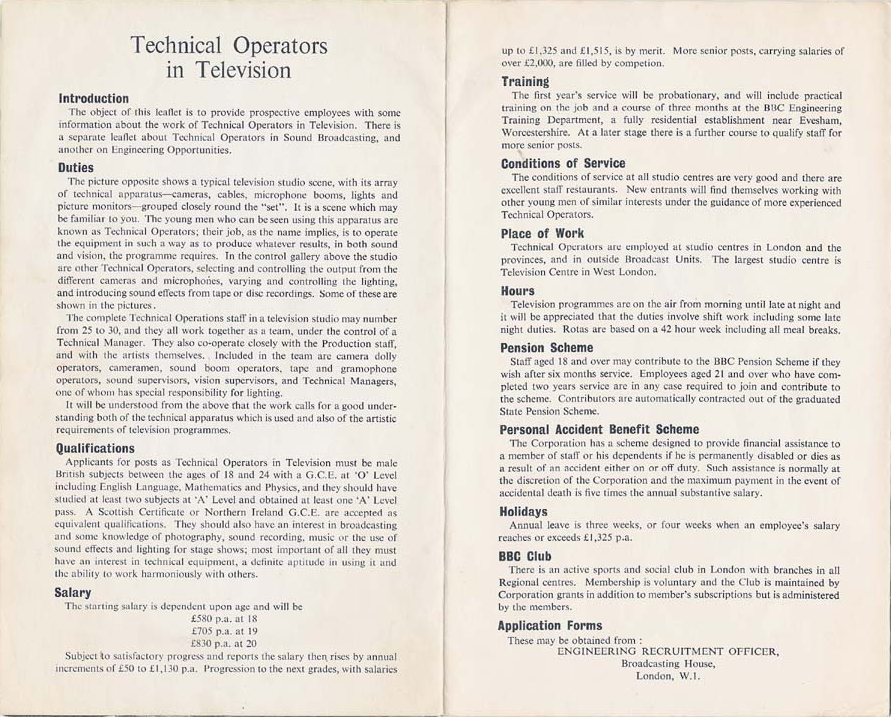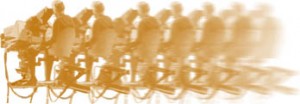Technical Operations
Many people – and many groups of people – were involved “behind the scenes” to put on each episode of a weekly drama series: story editors, scriptwriters, typists, set designers, set builders, set erectors (scenery people), sparks (electricians), lighting riggers, equipment riggers, floor managers (studio managers) and assistants, make-up artists, costume designers, wardrobe assistants, production secretaries, production assistants, film cameramen and sound assistants – the list goes on….
Technical Operators (or TOs) operated the technical equipment in the television studios and any ancillary equipment that supported television production (although equipment such as the telecine machines, videotape machines and film recording machines were operated by Technical Assistants (TAs) and Engineers). The recruiting pamphlet for 1965 describes some of the aspects of the job of a Technical Operator, and like many job descriptions from other industries, covers only the main points of the job, and misses some of the more “interesting” duties (and some of the boring, mundane activities) of the Technical Operations studio crews.

Under Technical Operations, Television Service (TO Tel S in BBC jargon), the bulk of Technical Operators were organised into Studio Crews made up of Cameramen (all men in the 1960s), camera dolly operators, microphone boom operators (Sound Assistants) and crew reliefs. The crew always worked together, and so built up really good working relationships within the team. At one point there were some 19 Camera Crews based at Television Centre to operate the studios in West London – Television Centre itself (eventually there were eight studios TC1 to TC8 (and then later a ninth studio dedicated to Children’s programmes) (at the time of this fictional episode of ”Softly, Softly”, studios TC6 and TC8 had yet to open) plus news studios, Presentation and Continuity for two channels), Lime Grove (four studios D, E, G and H), the Television Theatre (the old Shepherd’s Bush Empire Music Hall) and Riverside (two studies: 1 and 2). Apart from the studio crews there were ‘pools’ of camera staff, dolly operators, and sound assistants. There were also specialist operators assigned as needed to the studios: Gram Ops (tape and gramophone operators), Inlay operators, Vision Control Operators. Technical Operations also provided, as well, staffing for the two Presentation Studios, A and B.
At the beginning of the 1960s, the crews were managed by a Technical Operations Manager (TOM) who made decisions regarding the crews: the crews also included an assigned Vision Mixer. During the early part of the 1960s, firstly the Vision Mixers were reassigned to Studio Management – more part of the Production side of things, and then the Technical Operations Manager became a Technical Manager 2. and took more responsibility for the studio as a technical element contributing to the network. The Senior Cameraman took over responsibility for the crew and its technical competence.

In the 1960s, “Technical Operations” were very much a part of BBC Engineering Division, and Technical Operators were regarded more as failed engineers than craft people. According to what was written in one Technical Operator’s official BBC Job Description, a BBC Television Cameraman was completely incapable of independent thought.
He could not use his own initiative; he could not originate ideas; he could not react intuitively to a performance nor make any interpretation; he could make absolutely no creative contribution to the production process.
He could do nothing but blindly follow the Director’s instructions. This demeaning Job Description bore no relation to actual working practice, but it was used to justify the Cameraman’s low pay grade.Matters were even more complicated for the number 4 Cameraman, who was the junior Cameraman on the crew. He was on a lower pay grade than the others because, officially, he would only be required to perform ‘simple’ camerawork. In this context ‘simple’ was defined as only one camera operation at a time. Thus, he could pan, or track, or crab, or zoom, but he could not combine any two or more of these operations in a single shot. In reality, almost all camera movements require a combination of operations. In all but very simple productions, all cameramen were expected to be able to pan, track and focus all at the same time – some of the most complicated camera operations occurred on programmes that some people may have assumed did not warrant it – such as “PlaySchool”!
It should also be pointed out that Technical Operators (and others operating technical equipment) on a live television drama programme had a regular audience of up to 18 million people watching them in the 1960s.
There were plenty of good things about working for the BBC. The BBC in the early nineteen sixties was the premier broadcasting organisation in the world. From its very inception until the advent of “Producer Choice” and the use of freelance technical staff, the BBC trained all its technical staff to a very high standard. Training for Technical Operators covered all aspect of Radio and Television production, and covered a fair bit of the engineering needed to provide all the various services.
Staff were encouraged to move across the organisation – a number of cameramen became studio directors (for example, Stan Appel and Ray Butt) – TOs could transfer to became TAs (subject to gaining engineering qualifications such as the appropriate City and Guilds Examinations) and then progress to Engineers – and so on.
The crews were generally “self-selected” in that some crews specialised in one sort of production, and attracted crew members who enjoyed working on those sorts of productions – Light Entertainment, heavy Drama and so one. But all crews had to share in the more mundane programmes – the schools programmes, the news magazine programmes, current affairs programmes, the practical production exercises which trained up new directors – and the dreaded party political broadcasts….
This story follows a “general purpose crew”, Crew 7 (fictionalised, here, but really existed) working on a (fictional) episode of “Softly, Softly” and notes the roles of other Technical Operators, Technical Assistants and Engineers assigned to this individual episode. Crew 7 was assigned to each weekly episodes for the complete series of “Softly, Softly”: all crew members enjoyed working on these shows. The other (two) working days of the week could include a sitcom or a comedy programme, plus the usual diet of schools and current affairs,
 |  |  |



